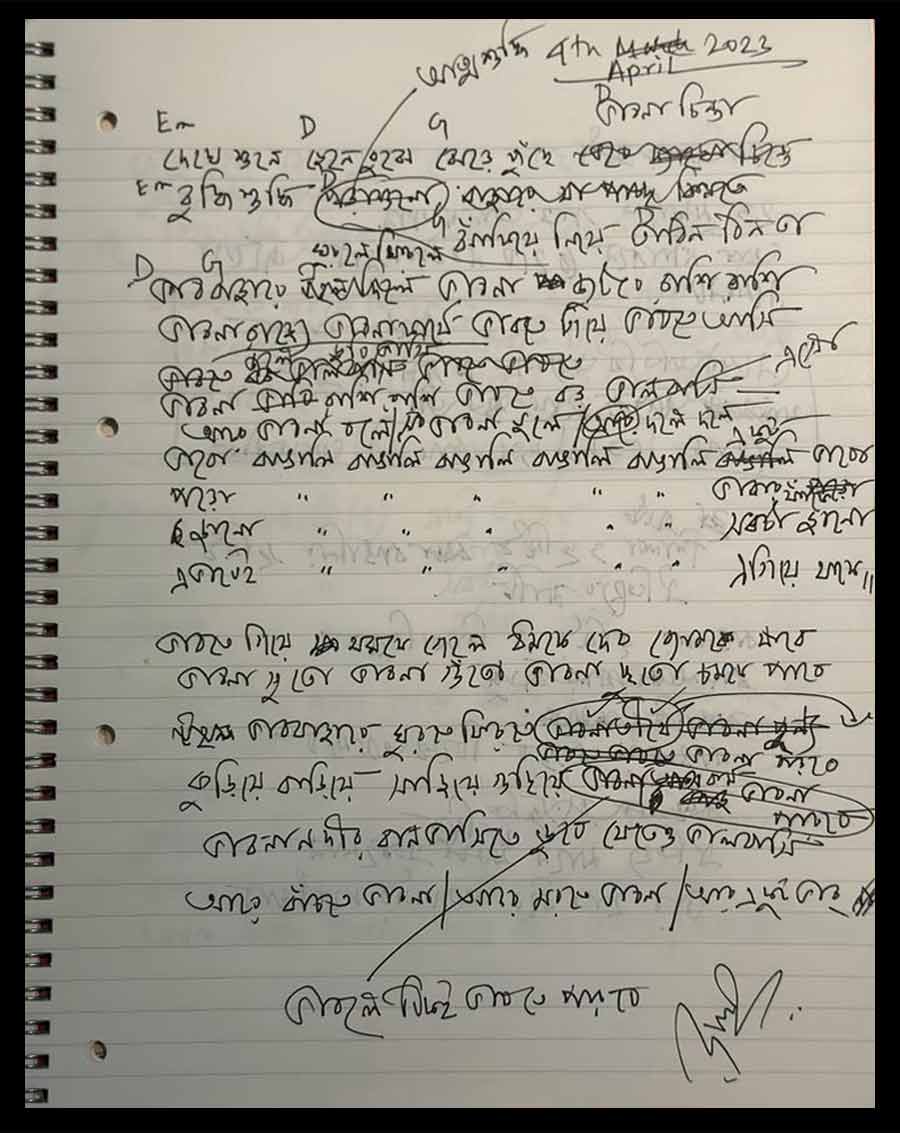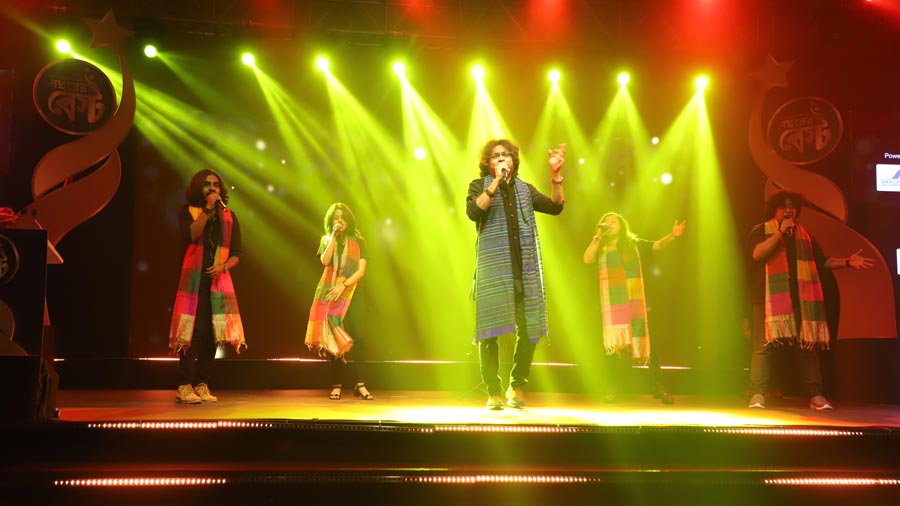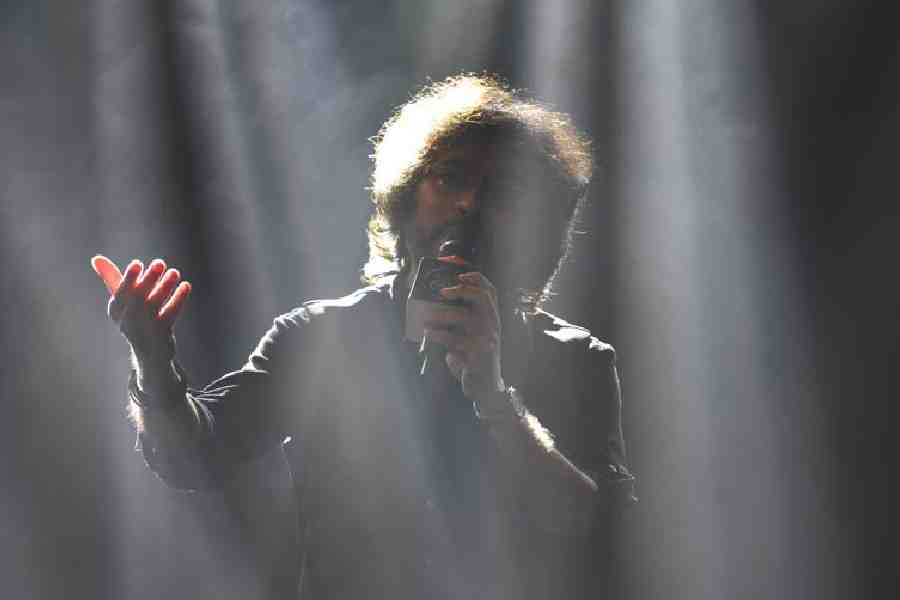A musical milestone was etched in Kolkata the other night. A rockstar sang a few bhajans topped with a Vedic hymn. It was as though Eric Clapton riffed through Abide With Me at a concert in Las Vegas or Neil Young strummed to The Lord's Prayer.
So gobsmacked was the audience at the Anandabazar Online Bochhorer Best 2022 at seeing Rupam Islam emerge from darkness and invoke universal values of harmony and truth with Sangachhadwam that for a while it forgot to applaud the opening act of the event, an annual celebration of achievers both known and unsung.
Now, days after the show at the ITC Royal, Rupam says he's overwhelmed at the response he has received for that performance. And not just because it is an unusual choice of songs for someone who is essentially a front-of-stage rock singer/songwriter with a huge following in Bengal and neighbouring Bangladesh. But more for the manner in which he made accessible these traditional anthems associated with solemn prayer meetings and rendered them suitable for an award function without diluting their essential teachings.
“Sangachhadhwam samvadadhwam samvo manaan sijaanataam.” Amid a cushion of soaring keyboards, just as the Vedic hymn extolling the virtues of the purest form of human values is about to take flight, it segues into a bhajan in adulation of Lord Rama. “Jaya jayati jaya Raghuvansha bhushan Ram arajiva lochanam”
“Wherever I have been going these days, people have been telling me how they have been overwhelmed by the medley,” reveals Rupam during a phone-in with The Telegraph Online. He seems pleased with the end result even though he had had apprehensions initially. “Every credit for this goes to editors at Anandabazar Online for giving me the confidence,” he says.
It all started with a call Rupam received. The idea was quite different initially. It was about reimagining the hit song Naatu Naatu with Bangla lyrics and an elevated sense of aesthetics. Then Rupam added another song, merely to add weight to the setlist. Soon, another musical element was added to infuse the idea of tradition as the building blocks of the future. This, however, gave birth to a fresh concern. How to marry two sets of songs of widely different genres?
Over to Rupam Islam on how it all started, the performance for which he had to mine singing skills he acquired at childhood and what’s he up to these days.
TTOnline: Take us through the journey of you performing at Anandabazar Online Bochhorer Best 2022.
Rupam Islam: The first proposal from Anandabazar Online was to do a Bengali interpretation of the song Naatu Naatu with a sense of sophistication to take it to a higher plane. I found it extremely challenging since I wasn’t drawn to the song at all. Anyway, I did listen to the song. And I immediately got my chorus. ‘Bhabo Bangali, Bangali, Bangali…’ This line came to me at first listen.
How?
Some magic happened, the kind that often happens with creative folks like us. I always latch on to the idea that comes first. And I realised that I would be able to do this. So, I called the editors of Anandabazar Online and told them that while I would be able to pull off their brief, doing only one song wouldn’t be worthwhile. I said I would also create a Bengali version of Jai Ho, another Indian song, that also won an Oscar. I knew I could do it as I had listened to this song earlier.
How did the devotional songs come in?
Since this was meant to be a special performance, I thought I should do four-five songs to do justice to the event. So the editors asked me if I could also do a selection of traditional tunes, say a song or two based on Sanskrit shlokas or the Vedas. I said yes. Since I have been trained in singing such songs, I could always work on a performance centred around this. But the question is how would I link the two?
So, what did you do?
I prepared a demo of both the sets and made the editors listen to it. They loved it. It was then decided that the first set, comprising Sangachhadwam and the bhajans, Jaya Jayathi Raghuvansha Bhushan and Tuma Karata Daatha Bidhata, would be performed at the start of the show. Their idea was to perform the first few lines of the opening song, Sangachhadwam, in darkness to keep the audience guessing who was singing on stage. Then gradually, the stage would light up to reveal that it is indeed me singing.
How did you prepare to present Sangachhadhwam?
I had not sung the Vedic hymn before, but I knew it pretty well. As a child I had heard my mother singing the song and teaching her students — she was assistant headmistress of a school where she was in charge of all cultural programmes. My mother used to also sing another song from the Vedas, Tamis Swaranam. So, I have always been familiar with these devotional songs.

While writing Bangla lyrics for 'Naatu Naatu', the chorus came to me first, says Rupam Islam Picture courtesy: Rupam Islam
And the bhajans?
I knew the bhajans from my student days at Banichakra [a music school of Kolkata that is a rite of passage for any musically inclined youngster]. I was there for around four years. And I learnt to sing all kinds of songs. I used to do very well there. I used to be ranked first every year. My training in music was always centred around such traditional, semi-classical songs.
Sandhya Mukhopadhay has also sung Jaya Jayathi Raghuvansha Bhushan.
Yes, I knew Sandhya Mukhopadhyay well. She used to like my songs and used to call me ‘bhai’. She has seen one of my online concerts. Unfortunately, she has left us. Otherwise, maybe I would have been able to bring her to one of our concerts. But I will always rue the fact that I could not sing this bhajan for her. Also, you know, this wasn’t the first time I performed Jaya Jayathi. I have done it in my solo shows. It was a simpler arrangement with only my guitar as accompaniment. And I dedicated it to Sandhya Mukhopadhay.
You mentioned singing lessons at Banichakra. But you have been singing on stage from a very young age?
Yes, when I was all of four. I went up on stage with my parents’ group, Jhankar Shilpi Goshthi, and played a percussion instrument. They were to perform and I insisted that I be allowed to go up on stage too. So, they bought me a maracas with which I got to do one rehearsal. Mind you I had only got the instrument the night before and learnt how to play it on my own. In the process I invented a completely new style of playing the shaker — my approach to it was kind of similar to playing the tabla.
What do you remember of your first appearance on stage?
Since it was dark, and I couldn’t see the audience, I remember going up to the edge of the stage to try and spot my Dida (grandmother) who was in the audience. Often, people talk of my showmanship. I believe it was born that night.
Today, Rupam is a sprightly man nearing 50, but looking at least two decades younger. Regular exercise to Brit pop keeps him fit. A busy schedule warranted by the multiple avatars he nurtures keeps him going. There are many Rupams at play here: school teacher Rupam, rockstar Rupam, “Ekok (solo)” Rupam, Fossils Rupam, playback Rupam, TV Rupam, podcaster Rupam, editor Rupam (Bangla Rock Magazine). Add to that writer Rupam, the author of seven highly successful books, two of which are based on the adventures of his fictional creation, Brahma Thakur, a “psychiatrist with a dark past”. Now, he’s in the midst of wrapping up Thakur’s latest exploits for a Bangla website.
Rupam works fast. He’s a creative Ninja. He needed only a page to write Bangla lyrics for Naatu Naatu. All of it in one go, with barely two changes before recording it. Recently, he put nine songs to tune (for a play) in about three hours flat. All this with an unnerving sense of confidence — “…actually nothing is impossible for me.”
That’s why perhaps he said yes to Bochhorer Best. It’s been a week or so since he sang, emerging on stage from darkness. Yet many who were there may still be humming Sangachhadwam, a tune we always knew but have left far behind. Some may have even wondered how far we have all come.
“May we march forward with a common goal. May we be open-minded and work together in harmony”.

Rupam Islam in performance











